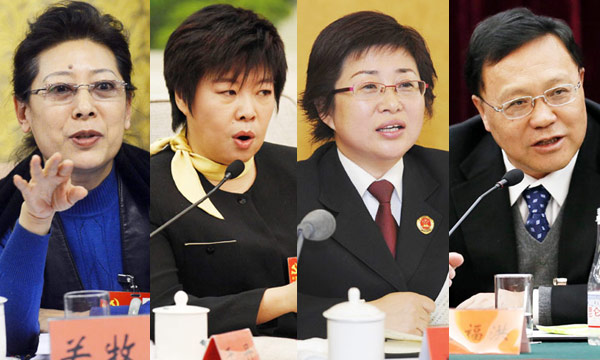Institutions open the door to scrutiny
By An Baijie (China Daily)
Updated: 2012-11-09 07:56
More cooperation
Guo Siping, spokeswoman for the Central Archives, said that she hopes to cooperate more with news media to provide the public with a more relevant and timely service.
The remarks were made in June 2010, when Guo and 10 others from various Central Committee departments were introduced to the public at a news conference. During the 70-minute event, which was broadcast live on China Central Television, all 11 - nine men and two women - pledged to improve access for media organizations and to boost transparency.
Not all of those in the spotlight managed to perform naturally at the conference, a legacy of years of behind-the-scenes activity, and one spokesman's hand trembled noticeably as he held the microphone and introduced himself to the reporters.
Wang Chen, director of the International Communication Office of the CPC Central Committee and also the minister of the State Council's Information Office, said publicizing and explaining Party information has become a major focus in recent years.
"(The system) is key to making Party affairs public by promoting intra-Party democracy, improving the Party's ability to govern and cultivating a favorable environment for the development of the CPC and China," said Wang.
The central committee first explicitly proposed setting up the system, and the move was ratified and endorsed at the Fourth Plenary Session of the 17th CPC Central Committee in September 2009.
The mechanism was established in central and provincial Party committees by the end of 2010, with all the relevant names and telephone numbers made publicly available.
The spokespersons are required to respond quickly to emergency cases and to play a leading role in informing the public about government policy.
More than 200 Party spokespersons underwent three days of training in Beijing in February 2011, during which they learned the skills required to answer journalists' questions, hold news conferences and to communicate with overseas media.
One of the people who helped train the liaison offices, Liu Xiaoying, a professor of news media research at the Communication University of China, said the trainees were required to play the roles of journalists and spokespersons in the training courses.
"By playing these different roles, they will better understand how reporters think," he said.
The mechanism has provided a platform for the public and helps guarantee their right to know, to participate, to express and to supervise, he said.
"Only when people's rights are protected, can the Party get timely feedback on its policies," he said.
Contact the reporter at anbaijie@chinadaily.com.cn
Related Stories
Top Party school opens up course design 2012-10-20 20:19
Education evolution of Central Party School 2012-10-19 14:25
Xi tells attendees at Party school to focus on study 2012-09-03 08:11
Party congress delegate hails power of cyberspace 2012-11-08 15:51
Sound bites from 18th Party Congress 2012-11-08 08:39
Eyes on Party congress 2012-11-08 07:58

Top News
Xi emphasizes adherence to CPC Congress spirit
Top legislator urges implementation of congress spirit
Moderately prosperous China brings chances to world
Video







